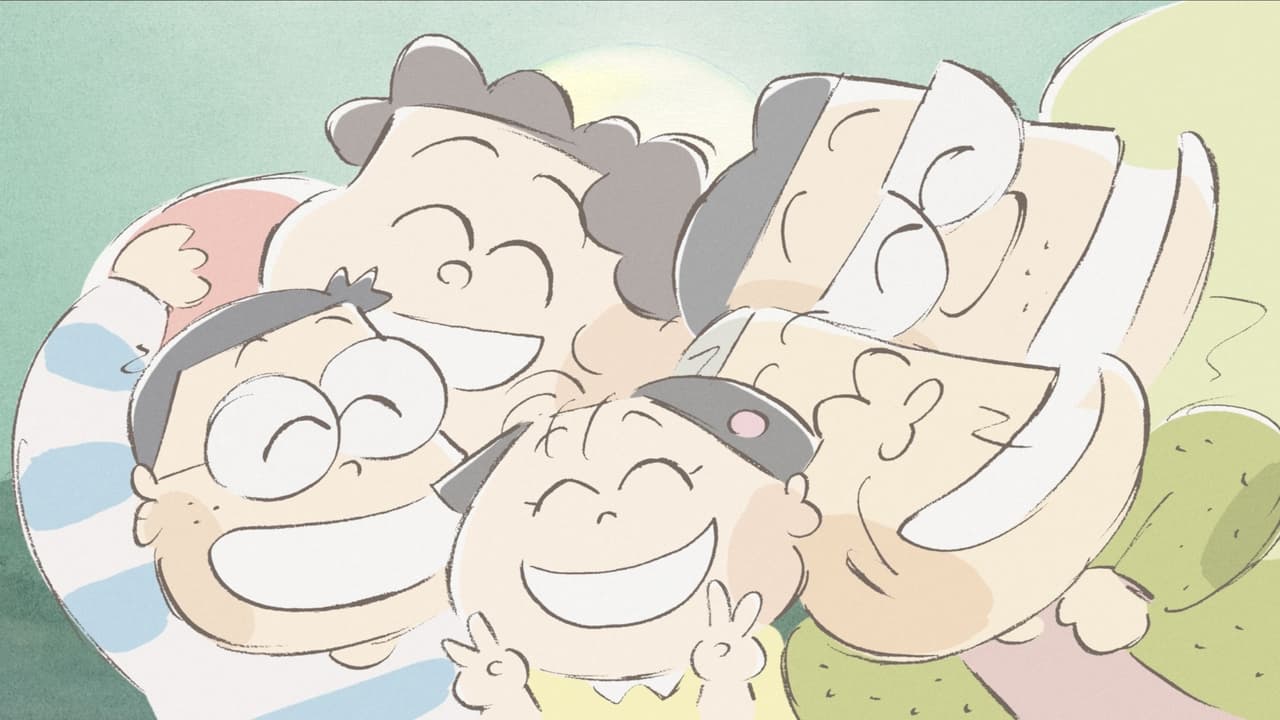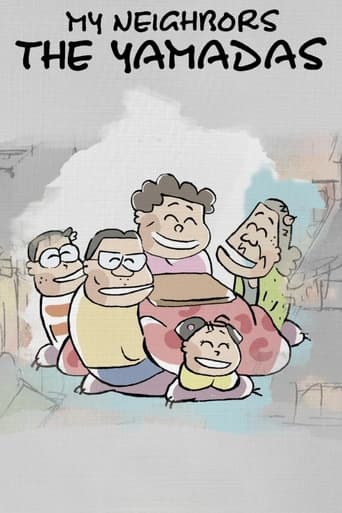

The hand-painted production guarantees that every frame of the film is very beautiful, but in contrast, the lens language of the film is slightly immature. Like many Japanese movies of similar style, the film tries to capture the texture of ordinary life in the details, but in the final effect, each chapter does not seem to be placed in the most suitable position. Therefore, because the story design is generally too sloppy, deliberately dividing the chapters and emphasizing the theme will naturally only be in a hurry.
... View MoreThis rather odd movie is what happens if you take a bunch of comic strips from a newspaper and animate each strip, then play them one after the other for an hour and a half. Sequences are often less than a minute, and rarely especially funny. There are some longer sequences, as when the family leaves the little girl behind in the shopping mall, but once again, the laughs are less than 1 per minute.I rather like the sketchy animation style, although I wouldn't go so far as to say I love it. But I could only take the lack of a story, the generic characters, and the weak jokes for the first half hour before giving up.Some people here have suggested the humor is cultural, and perhaps if your Japanese this movie is hilarious. But then a lot of user reviews here say it's hilarious, so perhaps like a lot of comedy it's just funny to some people and not to others. For me it's just boring.
... View MoreIt's easy to see why My Neighbors the Yamadas wasn't a success at the box office. It lacks the vivid colors of Miyazaki's films, there are no fantastical elements like magic, dragons and what have you, and the plot is so slice of life-y it's as far removed from what you might expect of a typical Ghibli film. Nevertheless, because Isao Takahata directed it, Yamadas rises above a typical slice of life film and becomes a celebration of daily life, presenting 'real' people and bursting with little, enjoyable details.As with many films in the slice of life genre, the plot isn't exactly heavy on dramatic twists and full-on drama. Rather, it is structured as a series of vignettes and excels in instilling a sense of watching a real family go about its business, watching the members do various things and have things happen to them and, crucially, feeling that ear-to-ear grin emerge on your face when you relate to what's occurring on screen. Little things like the father's inevitable need to be the hero of the family, resulting in a dream sequence in which he saves his family from peril; the father and mother arguing over who gets to use the remote; the father deciding he'll do the grocery shopping only to forget certain items; the daughter realizing that there was a time when her father and mother weren't married; the family dog seemingly judging the family with a perpetually cynical look on his face, etc. It's all done with humor and genuine insight to and love for human beings. Nowhere is this more apparent than the fact that despite the film's heavy focus on comedy, it never feel condescending. It never feels like the stuff on TV that passes for comedy these days. Characters – and therefore the audience – are always taken seriously.As with all of Takahata's output, the visuals are crucial for understanding the story and characters. It's the most minimalist of all Ghibli films, feeling like the almost childishly drawn versions of the flashback sequences from Only Yesterday. Characters are drawn with a handful of lines, environments are sparsely rendered, a lot of the time most of the screen is white, which makes all the more hilarious the fact that this is the first Ghibli film that has been made mostly on computers. It seems like Takahata was going for a 'less is more' approach. Not only did he go against the established Ghibli 'look', but he also showed how it's possible to tell a convincing story, to portray 'real' people and provoke audience sympathy with a minimal amount of brush-strokes. Not only that, the simplicity of the visual style corresponds with the equally 'simple' family life the film portrays. The film also exhibits Takahata's penchant for combining a highly realistic style with surreal flights of fancy (as seen in wonderful opening scene that has to be seen to be believed).If by reading the above plot summary (if one can call it a plot), you are instantly turned off by the prospect of intense boredom, then this film might not be for you. It requires patience, but those who possess it and give this film a chance will be highly rewarded. In lesser hands, this could have been highly clichéd, but in Takahata's hands, it's an experience that – very much like Only Yesterday – feels life-affirming, a celebration of life that feels funny and honest.
... View MoreMy Neighbors the Yamadas, directed by Isahao Takahata, is a Studio Ghibli film most known for its unusual animation style, which actually distinguishes it from all the other pictures released by this renowned studio. Based on a famous Japanese cartoon Nono-chan, it presents random and miscellaneous stories from the daily lives of the Yamada family. This is a great comedy with a twist for people of every age. It's packed with a huge amount of hilarious gags and situational jokes that will certainly make you laugh lots of times.Apart from that, these are the two main arguments that should be convincing enough to make you see My Neighbors the Yamadas: the computer-generated animations and drawings made in comic strip style are excellent, giving this Ghibli movie an entirely different feel than all their other works; the whole picture is actually presented in an unconventional manner, as the familiar contiguous plot was replaced here by a series of, so-called, vignettes (short impressionistic stories that aren't necessarily connected to one another), each with its own title at the beginning and a smart philosophical proverb at the end.In the film's first few minutes we meet all the members of this seemingly typical family: Takashi – the father, Matsuko – the mother, Shige – the grandmother, Noboru – the son, and Nonoko – the daughter. Every subsequent episode covers a different theme, some being hilariously funny and heartwarming, other touching and serious. Through all of the mostly humorous, yet truly realistic, sequences the viewer is able to observe the Yamadas as they cope with every day problems, misfortunes, rivalries, or just plainly ridiculous situations (like fighting over a TV remote, or deciding who will get the tea by playing 'rock-paper-scissors'). Through all of their adventures the viewer is able to get in touch with some of the Japanese traditions and customs. Every person in the family has his or her special role, making the cartoon much more believable. For example, Shige is the word of wisdom, giving advice to others and judging their actions, and Noboru is mostly seen as a selfish and ignorant studying-addict (which in final evaluation doesn't give planned results).If I will have to pick only one vignette, which made me laugh the hardest, I would have to go with 'Ginger Morning'. I think you will see why.All in all, My Neighbors the Yamadas is a laughable, yet purposely clever, and lighthearted, yet sometimes deep, anime that will provide great entertainment for the whole family. I guess that by looking at the Yamadas' experiences we can all learn how to live in perfect harmony with our relatives, replacing minor flaws with passionate love.Note: since the dubbed version is hard to find, I advise you to watch the Japanese version with English subtitles.
... View More